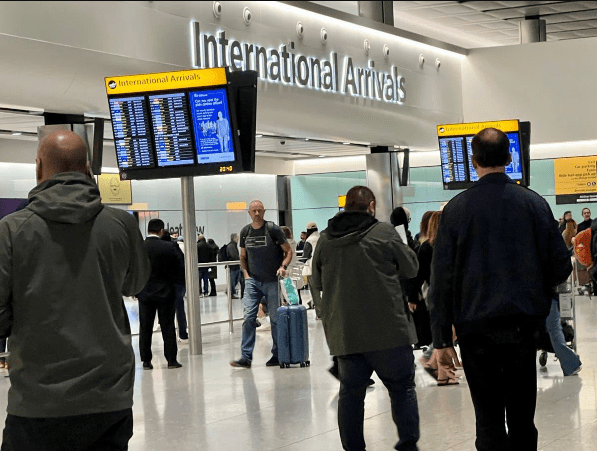Ministers assure the public that resilience plans are in place as UK energy security comes under renewed scrutiny.
The UK government has confirmed it’s reviewing its energy resilience following widespread blackouts that plunged parts of Spain and Portugal into chaos earlier this week.
Power failures disrupted transport, shut down traffic lights, and left people unable to withdraw cash. The blackout, which struck on Monday, saw major cities grind to a halt. While power was mostly restored by Tuesday morning, with Spanish energy distributors confirming over 99% recovery, concerns have quickly spread beyond Iberian borders.
“We’re constantly looking at our own resilience,” said Environment Secretary Steve Reed, speaking to Times Radio. “There’s a subcommittee of the cabinet, chaired by Pat McFadden, that is doing that day in and day out.
When it comes to what’s gone on in Spain and Portugal, we need to have a look at exactly what their investigation finds out, and then see what lessons we can learn from it. But it’s difficult to learn the lessons until they find out what’s caused it.”
The incident prompted swift responses across Whitehall. Energy Minister Michael Shanks addressed Parliament on Wednesday, emphasising that Britain has “robust emergency plans” in place.
“As a responsible government, we prepare for all eventualities, no matter how unlikely,” he said. Reassuring MPs, Shanks added that Britain’s power grid is “highly resilient” and highlighted efforts to “continually improve and maintain the resilience of energy infrastructure.”
Mixed Political Reactions
The blackout reignited a political debate over the UK’s shift to renewable energy. Kemi Badenoch, Conservative Party leader, speculated that reliance on renewables may be a factor behind the incident.
“Some have said that it’s cyber terrorism, but the more likely issue is the grid – that when you have an electricity supply that’s reliant on renewables, you need a lot of battery storage,” she said.
“And quite often, what we’re seeing is renewables running ahead of the storage facilities, which means that when you have surges one way or another, you end up with blackouts.”
Badenoch warned that current net zero strategies may be “not thought through,” arguing that the UK could be headed towards power shortages unless infrastructure catches up with clean energy ambitions.
Her comments followed a recent policy shift, where she dropped her party’s commitment to reaching net zero by 2050, calling the target “impossible” under current conditions.

Government Pushes Back
Downing Street, however, pushed back strongly against claims linking green energy to blackouts.
“In terms of the claims of reliance on net zero energy leaving countries affected vulnerable to power cuts, these are unfounded claims, and speculation at this stage,” a government spokesperson said.
The spokesperson also defended the UK’s green strategy: “Switching to clean energy offers security and a supply of electricity that fossil fuels cannot provide.
We’ve empowered the national energy system operator to carry out resilience functions across electricity and gas systems, and we’ll continue to work with industry and regulators to improve and maintain the resilience of old, new and future energy infrastructure.”
Energy Secretary Ed Miliband echoed that sentiment, cautioning against “jumping to conclusions.” He confirmed that he had already spoken with the UK’s National Energy System Operator (Neso) in light of the events in Spain and Portugal.
Broader Security Context
Home Secretary Yvette Cooper also weighed in, saying that energy grid resilience is part of a broader national security review.
“We’ve been looking, as part of wider security reviews across the country, how we deal with both resilience and also different kinds of challenges and threats,” she told Sky News.
Meanwhile, former Prime Minister Sir Tony Blair criticised the broader climate conversation in a foreword for a new report from the Tony Blair Institute. He claimed current climate policies are “doomed to fail” if they require voters in developed nations to make significant financial or lifestyle sacrifices with little global effect.
“In developed countries, voters feel they’re being asked to make financial sacrifices and changes in lifestyle when they know that their impact on global emissions is minimal,” he wrote.
Still, No. 10 insists that the UK’s energy strategy balances ambition with stability and poses minimal disruption to the public.
Power Outages Becoming More Frequent?
This week’s Spanish blackout wasn’t an isolated case. Just weeks ago, Heathrow Airport suffered a major outage after a substation fire, forcing flight operations to stop for most of the day. Over 270,000 passengers were affected on 21 March alone.

Mr Miliband had then admitted that the government would “have to look hard” at resilience across essential national infrastructure.
While the cause of the Iberian blackout remains under investigation, the UK government is watching closely. Ministers insist that the British power grid remains strong, but events like this have brought vulnerabilities into sharp focus.
The political divide over net-zero plans continues to deepen, yet all sides agree: resilience is no longer optional — it’s essential.






